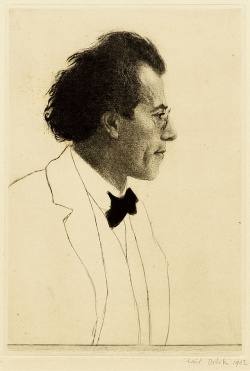Gustav Mahler
Gustav Mahler (7 July 1860 – 18 May 1911) was a late-Romantic composer and one of the leading conductors of his generation. As a composer, Mahler acted as a bridge between the 19th-century Austro-German tradition and the modernism of the early 20th century. While in his lifetime his status as a conductor was established beyond question, his own music gained wide popularity only after periods of relative neglect which included a ban on its performance in much of Europe during the Nazi era. After 1945 the music was discovered and championed by a new generation of listeners; Mahler then became a frequently performed and recorded composer, a position he has sustained into the 21st century.
Biography
Gustav Mahler was born to a Jewish family in the village of Kalischt in Bohemia, in what was then the Austrian Empire, now Kaliště in the Czech Republic.
In November 1901, he met Alma Schindler, the stepdaughter of painter Carl Moll, at a social gathering. This meeting led to a rapid courtship; Mahler and Alma were married at a private ceremony on 9 March 1902.
Around Christmas 1910 he began suffering from a sore throat, which persisted. On 21 February 1911, with a temperature of 40 °C (104 °F), Mahler insisted on fulfilling an engagement at Carnegie Hall, After weeks confined to bed he was diagnosed with bacterial endocarditis, a disease to which sufferers from defective heart valves were particularly prone. On 8 April the Mahler family and a permanent nurse left New York on board SS Amerika bound for Europe. They reached Paris ten days later, where Mahler entered a clinic at Neuilly, but there was no improvement; on 11 May he was taken by train to the Lŏw sanatorium in Vienna, where he died on 18 May.
Theosophical involvement
Occultism was thriving in fin-de-siècle Vienna when Mahler was about forty years old.
There was more to turn-of-the-century Vienna than sometimes meets the scholarly eye. In addition to the kinds of figures and topics that tend to reinforce “legitimate” areas of investigation - philosophy, music architecture, and psychoanalysis, for instance – there was an occult underground present in Vienna, as in much of the German-speaking world. This was a world in which Theosophy, Anthroposophy, Pythagoreanism, astrology, clairvoyance, numerology and other forms of occult belief played roles – and at times important roles – in the lives of some of the same figures who appear often in writing about fin-de-siècle Vienna. [1]
In his book, Hammer of the Gods, David Luhrssen includes Mahler as a member of Vienna’s Theosophical Society.
The original membership of Vienna’s Theosophical Society, at its foundation in 1887, was drawn from a coterie of intellectuals and bohemians who had been meeting continually since the end of the 1870s. Friedrich Eckstein (1861-1939), the Society’s first president and later a “gray eminence of Viennese cultural life,” had been presiding over discussions at a table in a Viennese vegetarian restaurant for a decade before the Society was formally organized in Austria’s capital. The circle around Eckstein, who had been Anton Bruckner’s personal secretary, was diverse in ethnic origin and in politics. It included Polish poet Siegfried Lipiner; Jewish symphonic master Gustav Mahler; Austrian composer of German art songs Hugo Wolf; feminist Rosa Mayreder, who discussed gender roles in terms of the alchemical fusion of opposites; Rudolf Steiner, who later established the Waldorf school movement along with a mystical Christian branch of Theosophy called Anthroposophy; and, occasionally, Victor Adler, founder of the Social Democratic Party of Austria. [2]
Online resources
References
- ↑ Covach, John, Balzacian Mysticism, Palindromic Design and Heavenly Time in Berg’s Music, Encrypted Messages in Alban Berg's Music, ed. Siglind Bruhn Routledge (New York & London: Garland Publishing, Inc., 1998)
- ↑ Luhrssen, David, Hammer of the Gods: The Thule Society and the Birth of Nazism (Washington, D.C., Potomac Books Inc., 2012) p.13

